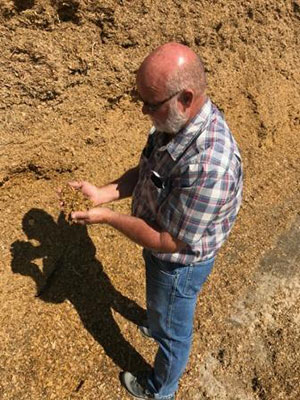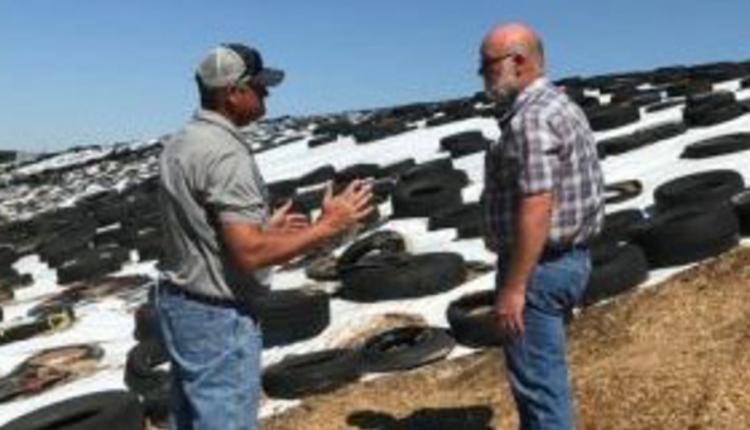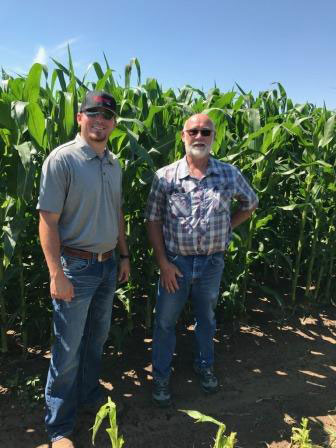
Ed Hilger, a silage corn grower from Ulysses, Kansas, has won a year of free silage testing courtesy of Mycogen Seeds. The Mycogen Seeds Silage Testing Sweepstakes was one way the team at Mycogen demonstrates the importance of testing to properly track the quality and composition of silage.
“Producers and corn silage growers need the ability to understand silage quality with testing both at harvest and before feeding,” says Jim Henry, western dairy development manager for Mycogen Seeds. “We partner with farmers to decode their silage composition through testing. That gives them a clearer picture of their feeding program to build the best ration possible for their herds.”
Hilger grows 6,000 acres of corn that is used as silage, earlage or high-moisture corn for a large scale dairy in southwestern Kansas.

“We need to know what makes that cow happy,” Hilger says. “The only way we can do that is testing our silage and knowing how to use the product when it comes out of storage.”
Hilger uses testing data to evaluate the starch and fiber content as well as the digestibility of his corn silage hybrids. With results in hand, he works with his teams at the dairy and Mycogen to produce a high-quality forage that meets the dairy’s needs.
“Ed is one of my elite silage growers and he is constantly looking for the next best thing in quality and tonnage,” says Landon Lukens, sales representative for Mycogen Seeds. “Every hybrid is tested and evaluated as it is grown, harvested, stored and fed.”
“Landon helps me throughout the year to analyze data we receive from testing and use it to make decisions or adjustments for the next year,” Hilger says. “That includes selecting the right hybrids for the right acres that will deliver a high-quality result.”
Henry offers these harvest and silage testing best practices as producers near harvest and prepare to store and feed a new silage crop.
- Pull a quality sample. Corn silage testing starts with a high-quality sample. Producers should remove at least a feeding, or better yet, a day’s worth of silage from the exposed face. Next reach deep into the pile or bag with a cup to scoop a representative sample of silage, placing the silage in a clean, dry bucket. Blend the silage in the bucket and dump it onto a clean, dry and smooth surface for subdividing. Mix thoroughly and cut the silage sample in half with a rigid instrument, like a clipboard. Discard half and remix the remaining half, following the same procedure until the desired amount of silage for sending to the lab for analysis is obtained. Place the final remaining sample in a sturdy, sealable plastic bag, squeeze out as much air as possible and seal the bag. I recommend sending two samples for analysis and averaging the results to minimize sampling error.
- Work with a trusted lab. There are many labs to choose from when submitting and processing corn silage samples. Be sure to use the same lab for consistency in testing practices, types and procedures.
- Tell your lab the hybrids you grew. Testing results may vary slightly based on what type of corn silage producers grow. Certain tests may yield more accurate results for particular hybrids. Mycogen Seeds recommends using a lab that practices in-vitro testing (wet chemistry) instead of near infrared (NIR) spectroscopy for measuring fiber digestibility. In-vitro testing provides the most accurate values through a direct analysis of individual nutrients.
- Test regularly. Corn silage should be tested at harvest and again at least monthly, after opening. If producers expect there to be variation, testing more often is recommended. Moisture content of the silage should be checked on the farm at least weekly or when rain or snow events occur. Throughout the year, producers should analyze samples and adjust their ration to fit the composition of their corn silage to achieve optimum results from the herd.
- Consult a local expert. Producers should meet with their local nutritionist regularly to pull quality samples, evaluate results and adjust their ration.

To learn more about Mycogen® brand corn silage hybrids, talk with your local representative or dealer, or visit Mycogen.com/Silage.
About Mycogen Seeds
Mycogen Seeds offers leading genetics in corn, soybeans, silage corn, sunflowers and canola. A seed company of Dow AgroSciences LLC, Mycogen Seeds maintains a robust global research and development program to bring growers high-performance genetics with the latest trait technologies. Mycogen Seeds is committed to helping growers be better acre after acre with dependable seed, smart ideas and hard work. For more information about Mycogen brand products, visit Mycogen.com or follow Mycogen Seeds on Facebook, Twitter and YouTube.
About Dow AgroSciences
Dow AgroSciences discovers, develops, and brings to market crop protection and plant biotechnology solutions for the growing world. Based in Indianapolis, Indiana, USA, Dow AgroSciences is a wholly owned subsidiary of The Dow Chemical Company and had annual global sales of $6.2 billion in 2016. Learn more at www.dowagro.com. Follow Dow AgroSciences on Facebook, Twitter, LinkedIn, and Google+, or subscribe to our News Release RSS Feed.

